In 2025, the AI music industry is expected to reach a staggering $6.2 billion, with projections pushing it to $38.7 billion by 2033. Generative AI alone is set to hit $2.92 billion this year. Around 60% of musicians now use AI tools for mastering, composing, or creating artwork.
AI-generated music is projected to boost industry revenue by 17.2%, and 82% of listeners can’t distinguish between human and AI-made music. With 74% of users relying on AI for music discovery and over 50% of top-streamed tracks shaped by algorithms, AI is revolutionizing how music is created, shared, and experienced globally.
In this report, I cover the latest AI music stats, including how it’s used, adoption trends, challenges, case studies, and more. Let us get right into it.
AI Music Statistics 2025: Key Highlights
- The AI music market is expected to hit $6.2 billion by 2025 and grow to $38.7 billion by 2033.
- The generative AI music industry is projected to be valued at $2.92 billion in 2025, reaching $18.47 billion by 2034.
- About 60% of musicians are using AI for tasks like mastering, composing, and even generating artwork for their projects.
- AI-generated music is expected to boost the music industry’s revenue by 17.2% in 2025.
- 74% of internet users have used AI to discover or share music.
- 82% of music listeners can’t tell the difference between music made by humans and AI.
- 77% of people are concerned that AI-generated music doesn’t appropriately credit the original artists.
How Big Is The AI Music Market?
The AI music market is expected to reach $6.2 billion by the end of 2025.
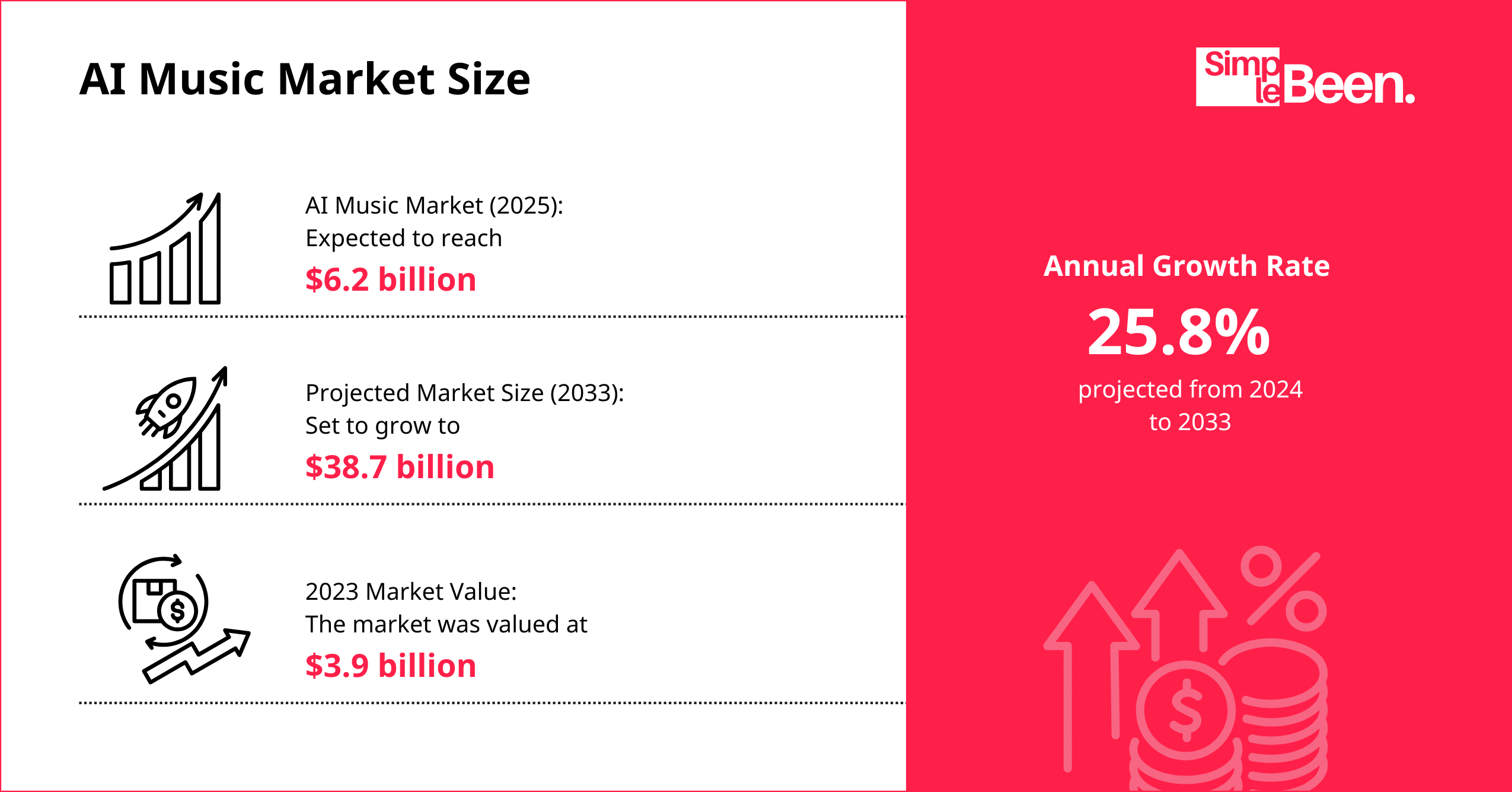
This growth is set to accelerate, reaching $38.7 billion by 2033, up from $3.9 billion in 2023, with an annual growth rate of 25.8% recorded between the forecasted period of 2024 to 2033.
AI is transforming music creation by generating songs without human input. It analyzes patterns in existing tracks to produce new melodies, rhythms, and harmonies, leading to fresh music styles and faster production.
More artists and producers are embracing AI to experiment with sounds, automate tasks, and enhance creativity. As technology advances, AI isn’t just simplifying music production—it’s reshaping the entire industry.
Generative AI Music Industry
Generative AI in music is estimated to be valued at $2.92 billion by the end of 2025.
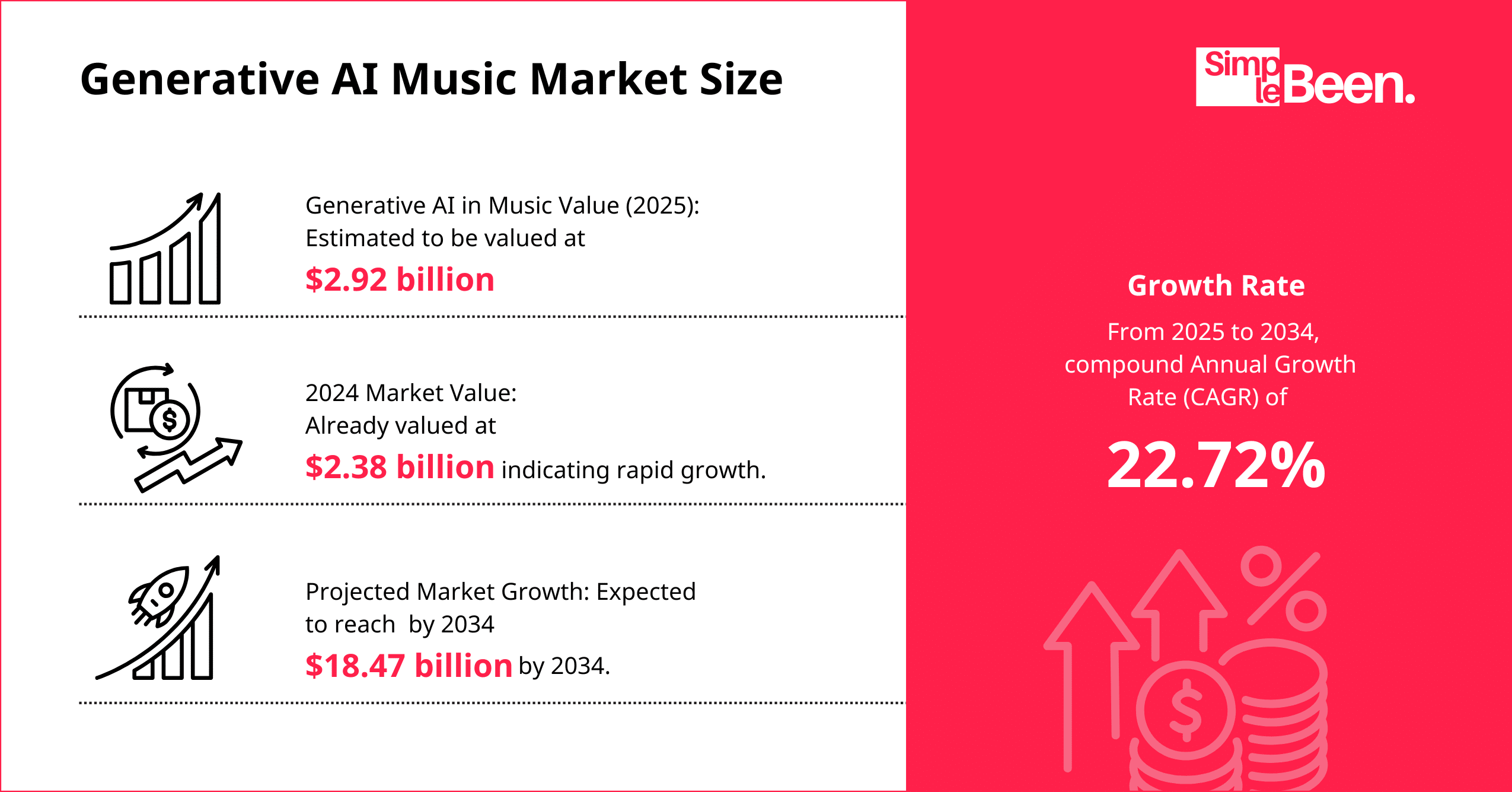
In 2024, the market was already valued at $2.38 billion, highlighting its steady rise. This rapid expansion is expected to continue, reaching approximately $18.47 billion by 2034, with a CAGR of 22.72% between 2025 and 2034.
One key reason for this expansion is the rising demand for personalized music. AI-driven recommendation systems are now essential for streaming platforms, creating tailored playlists that engage listeners. As people look for music that matches their tastes, AI is transforming how songs are discovered and enjoyed.
What Percent Of Music Is AI Generated?
Around 60% of musicians are using AI for a variety of tasks, including mastering, composing, and even generating artwork for their projects.
The speed and efficiency of AI are significant factors in its growing popularity. For example, AI can create a basic melody in less than 2 seconds, making it 20 times faster than humans when generating music.
This efficiency is driving its adoption among artists and musicians, with 20.3% of them having utilized AI for music production. Moreover, AI technology is being employed by 30.6% of artists for mastering tracks and 38% for creating artwork associated with their music.
This incredible speed is one of the key reasons why more and more artists are turning to AI Music to enhance their creative process. 20.3% of musicians have already embraced AI in their music production, finding it useful for everything from composing to perfecting their tracks.
Additionally, 30.6% of artists are using AI for mastering their music, ensuring the final sound is polished, while 38% are using it to generate visually striking artwork to accompany their music. As AI continues to evolve, its role in music creation is only set to expand, offering artists new ways to explore and express their creativity.
(Market.us)
How Has AI Affected Music?
In 2025, AI-generated music is expected to drive a 17.2% increase in revenue for the music industry.
As more artists turn to AI for composing, mastering, and creating artwork, the technology is helping musicians work faster and think outside the box. This growing adoption is not only pushing creative boundaries but also contributing to the industry’s overall growth.
(Market.us)
Adoption Of AI In The Music Industry
74% of internet users have already used AI in some form to discover or share music.
Whether through personalized playlists or curated recommendations, AI is becoming a go-to tool for music lovers exploring new sounds and sharing their favorites with others.
(market.us)
Interestingly, 82% of listeners say they can’t tell the difference between music created by humans and music generated by AI.
This shows how advanced AI has become in replicating the creativity and nuances of human-made music, blurring the lines between the two.
(market.us)
AI music platforms like Amper Music are leading the charge in the industry.
The platform has secured $4 million in seed funding to develop its AI-driven music creation tools further. This investment highlights the growing interest in AI-generated music and its potential to transform the music industry.
(market.us)
Over 50% of the top 20 global hits on streaming platforms are shaped by AI recommendations.
These algorithms are helping listeners discover their following favorite tracks, making AI a crucial part of the music discovery process and how music is enjoyed today.
(market.us)
Challenges Of Adopting AI In Music
By 2028, 23% of music creators’ revenue could be at risk due to generative AI, with potential losses reaching AUD$519 million.
Many musicians are already using AI in their work, with 38% incorporating it into their music and 54% believing it can help with creativity. However, 65% of musicians feel the risks of AI outweigh the benefits, and 82% worry it could threaten their ability to earn a living from their music.
Additionally, 83% believe that with more AI-generated music, issues like song visibility on streaming platforms are becoming more important, and 88% think that human-made music should still be promoted more on these platforms.
A significant 89% of Aboriginal and Torres Strait Islander music creators believe that AI will contribute to a rise in cultural appropriation.
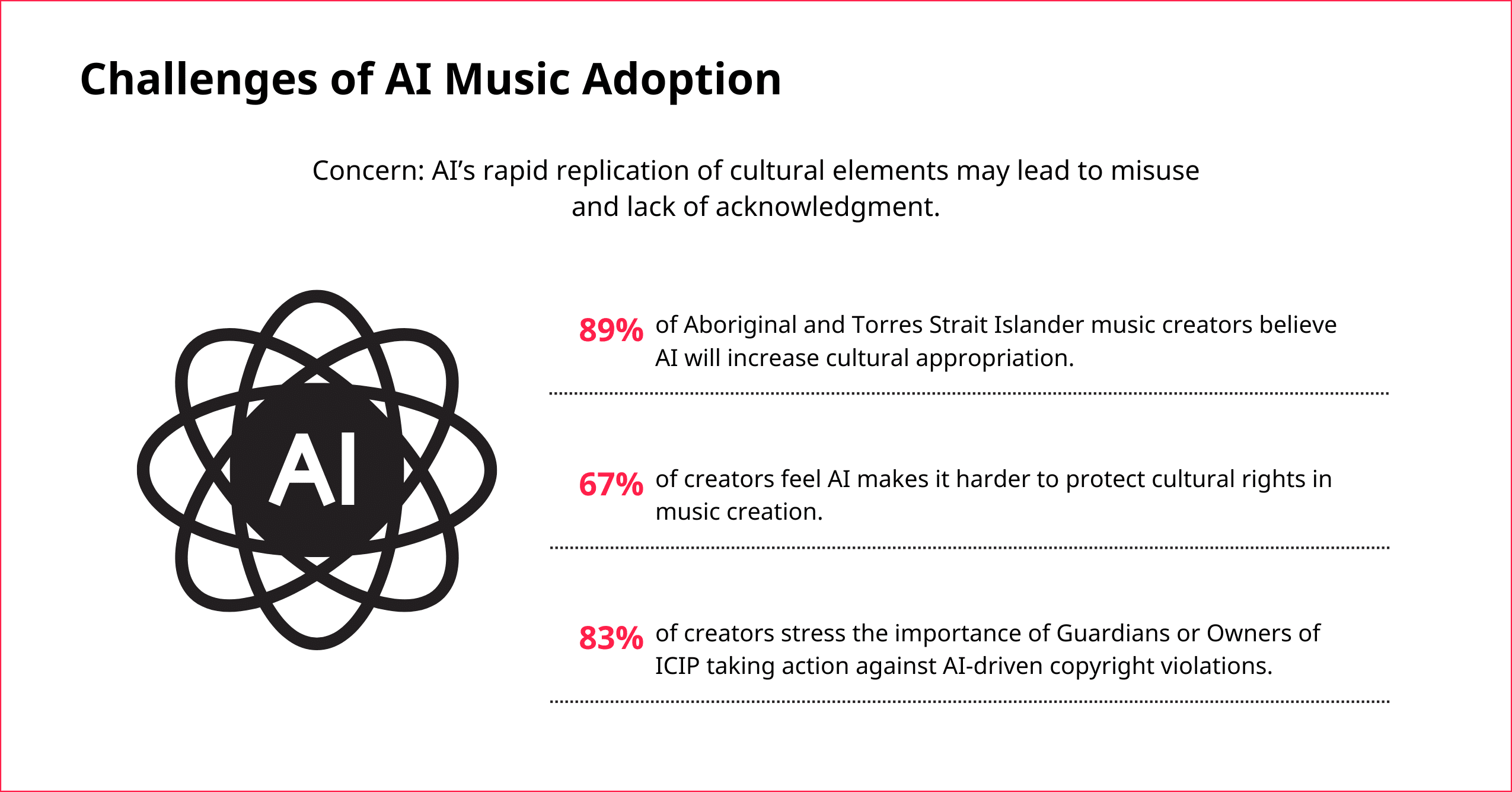
They are concerned that the technology can replicate or mimic cultural elements without understanding or respecting their true origins.
Additionally, 67% of these creators feel that using AI in music creation makes it more challenging to protect their cultural rights. They worry that AI’s ability to quickly replicate traditional sounds and styles could lead to exploiting their cultural heritage without proper acknowledgment or permission.
Furthermore, 83% emphasize the importance of allowing the Guardians or Owners of ICIP (Indigenous Cultural and Intellectual Property) to take action against AI-driven copyright violations. These creators believe that those responsible for safeguarding Indigenous culture should have the authority to address misuse of their intellectual property in AI-generated music.
(CISAC.org)
95% of creators think that before AI systems use any copyrighted material as input, they should first seek permission from the original copyright holders.
This is seen as a necessary step in respecting the rights of creators and ensuring they are properly compensated for their contributions.
(CISAC.org)
97% of creators believe that policymakers need to pay closer attention to the challenges AI poses to copyright laws.
As AI evolves, lawmakers must address how these new technologies intersect with intellectual property rights to protect creators and their work.
(CISAC.org)
97% of creators think AI providers should be required to disclose when they use copyrighted works for training.
They believe artists and copyright holders must know how their work is being used by AI, ensuring transparency and respect for their creations.
(CISAC.org)
AI Music Consumer Behavior
77% of people are concerned that AI-generated music often fails to credit the original artists properly.
This lack of recognition can lead to potential copyright disputes and undermine the value of the original work, further complicating the relationship between AI and the music industry.
(market.us)
79% of music fans believe human creativity is essential for music creation, while 74% think AI should not clone or impersonate artists without authorization, according to a recent IFPI survey.
The majority of respondents (97%) agree that AI developers should disclose the training data used to create music, in line with the EU AI Act. The survey, which included participants from 26 countries, highlights a growing concern about AI’s role in music. As AI technology continues to shape the industry, transparency is key to ensuring ethical practices and protecting the rights of music creators.
Case Studies Highlighting The Use Of AI In The Music Industry
AI is revolutionizing the music industry, transforming how music is created and experienced. In this section, we’ll explore case studies that highlight its impact and innovative applications.
Case Study 1: The Impact Of Artificial Intelligence On Music
AI in music composition has evolved significantly, starting with early algorithms and progressing to more advanced techniques. Cope’s 1981 “Experiments in Musical Intelligence” was one of the first attempts. Using Natural Language Processing (NLP) and Case-Based Reasoning (CBR), software could generate lyrics and melodies. With deep learning and Recurrent Neural Networks (RNNs), AI’s ability to create sophisticated lyrics improved, with one study achieving 92% accuracy in classifying lyrics using NLP tools. These advancements foster greater collaboration between AI and human creators.
AI tools like Ampler Music, AIVA, and IBM’s Watson Beat assist musicians in generating lyrics and music compositions, allowing for customization based on mood and style. However, some musicians remain skeptical about AI’s acceptance due to concerns over its credibility and impact on royalties. Legal issues, such as copyright infringement, also arise as AI learns from existing music. While AI can enhance creativity by reducing routine tasks, many argue that human emotional and cultural input remains essential in music creation, raising concerns about the potential loss of the human touch in the industry.
( International Association for Computer Information Systems)
Case Study 2: AI & Copyright
Over the past few decades, the music industry has undergone significant transformations, with generative AI set to lead the next wave of change. A shift from physical to digital music distribution has increased access to music, and now, AI tools like music synthesis models are revolutionizing music creation.
In 2023 alone, over 15 new AI models were introduced that generate music in response to text, audio, or image prompts.
However, AI’s role in music is controversial, highlighted by the viral “Heart on My Sleeve” song, an AI-generated track mimicking Drake and The Weeknd. This incident sparked debates over copyright laws, with labels criticizing AI-generated music. As of April 2023, Drake’s label, Universal Music Group, argued that the use of AI for cloning artists’ music was a breach of copyright law, leading to the song’s removal from streaming services.
Despite such concerns, some artists see AI as a tool for increasing accessibility and opportunities. For example, AI allows producers to collaborate with singers they would otherwise not have access to. However, many artists fear that AI may replace human musicians entirely, automate the creative process, and even result in cultural appropriation. As AI evolves, musicians hold mixed views about its impact on the industry.
Also Read:
Conclusion: 60% Of Musicians Are Already Using AI In Music
As the AI music market accelerates toward $38.7 billion by 2033, ethical concerns and copyright challenges are rising alongside innovation. While 97% of creators call for transparency in AI training data, 77% worry about the uncredited use of their work.
Over 65% of musicians believe the risks of AI outweigh the benefits. Yet AI tools like AIVA and Amper are already shaping soundtracks, compositions, and user experiences.
With 83% of creators pushing for stronger protection of Indigenous Cultural and Intellectual Property, the future of AI music hinges on balancing creativity, ethics, and compensation, ensuring technology enhances, rather than exploits, musical expression.
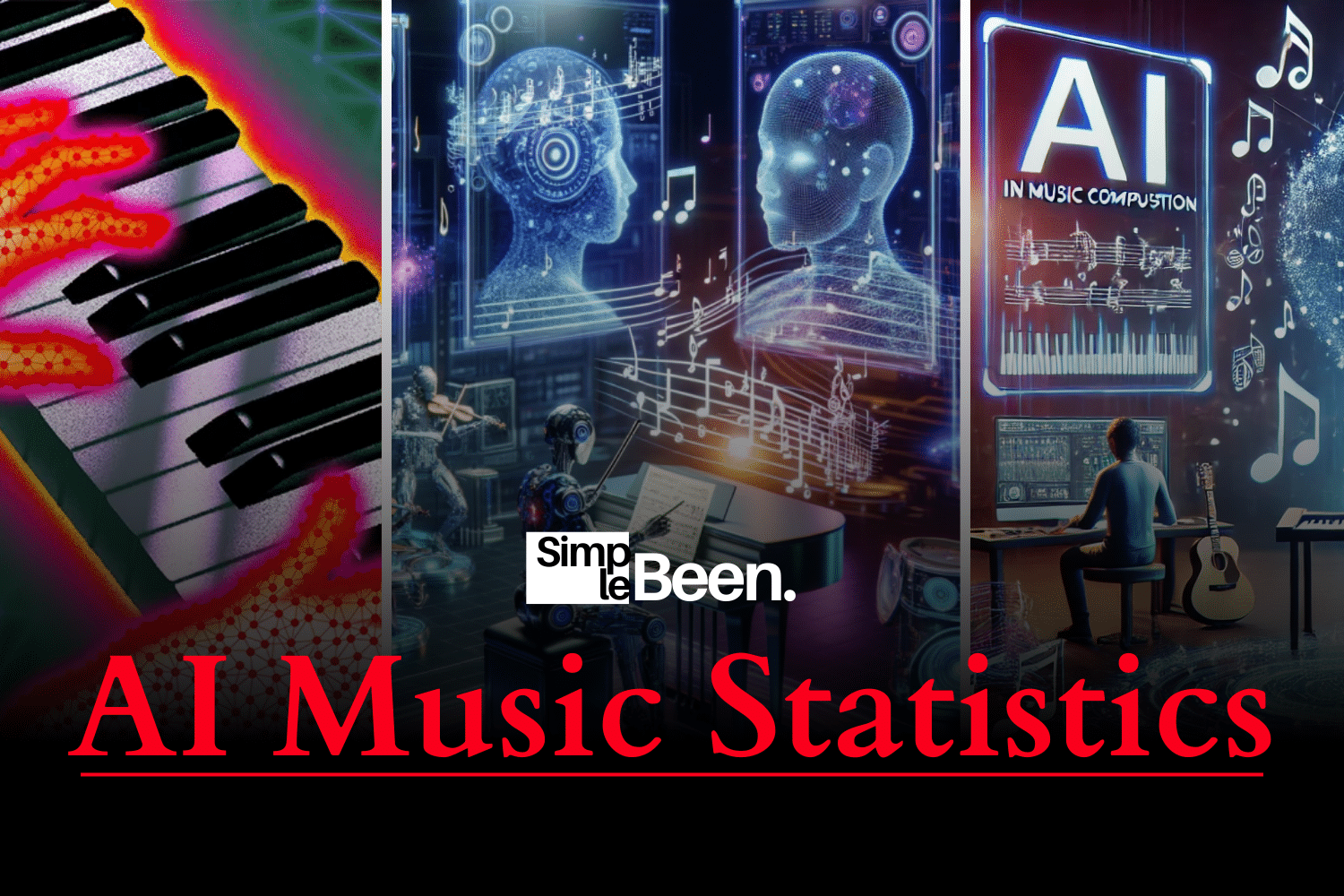
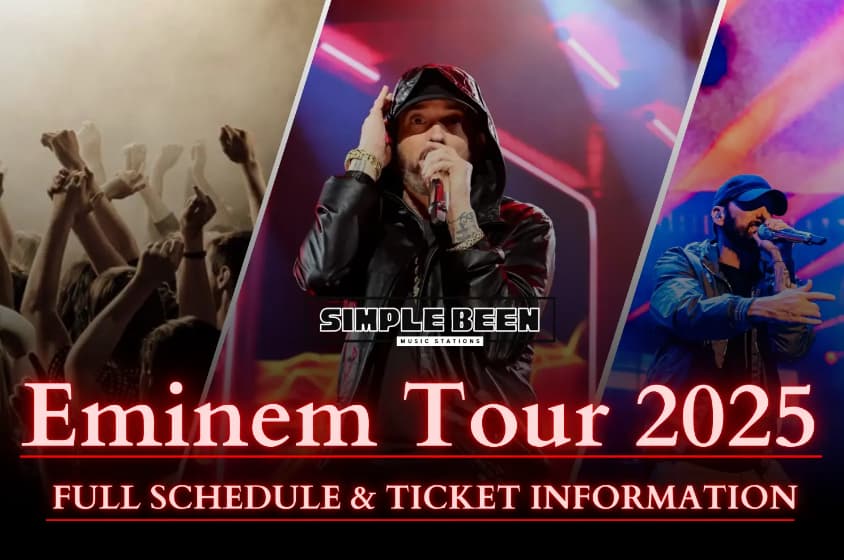


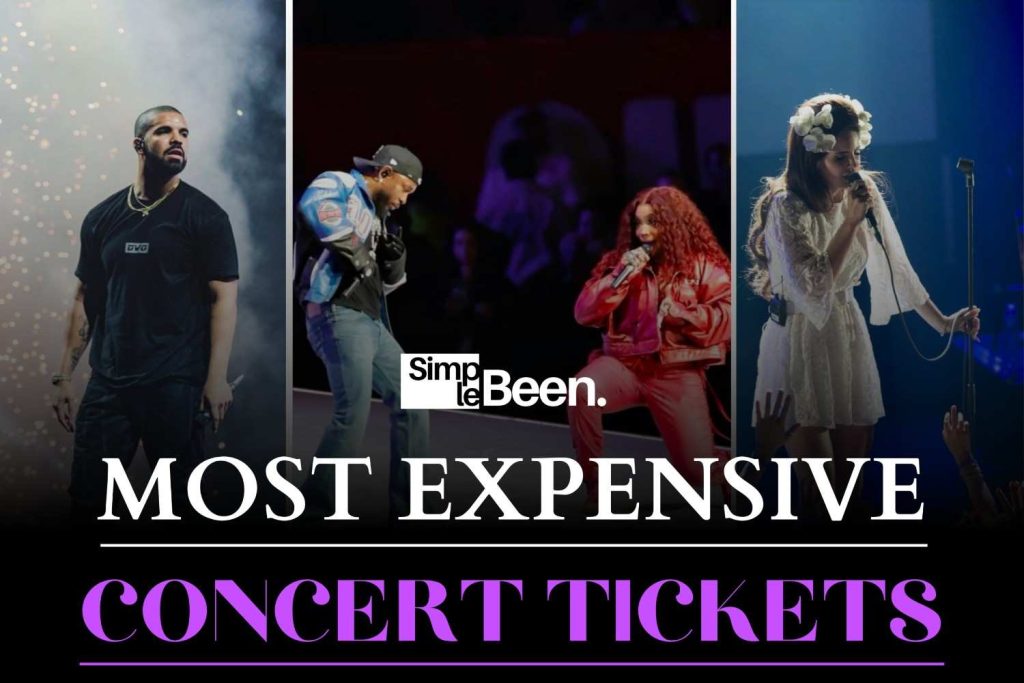
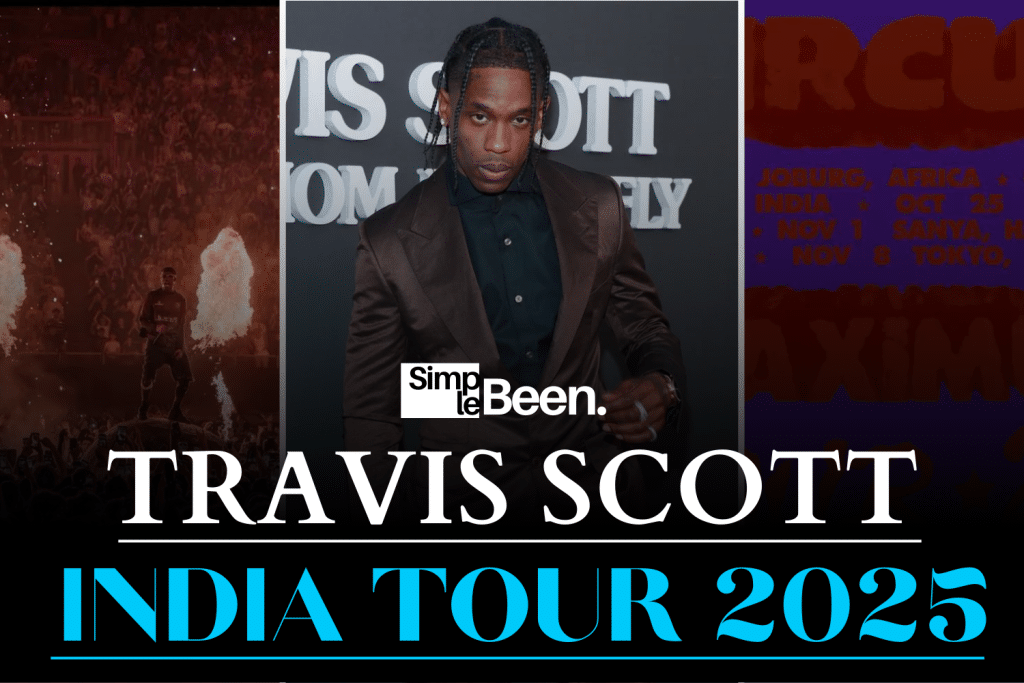
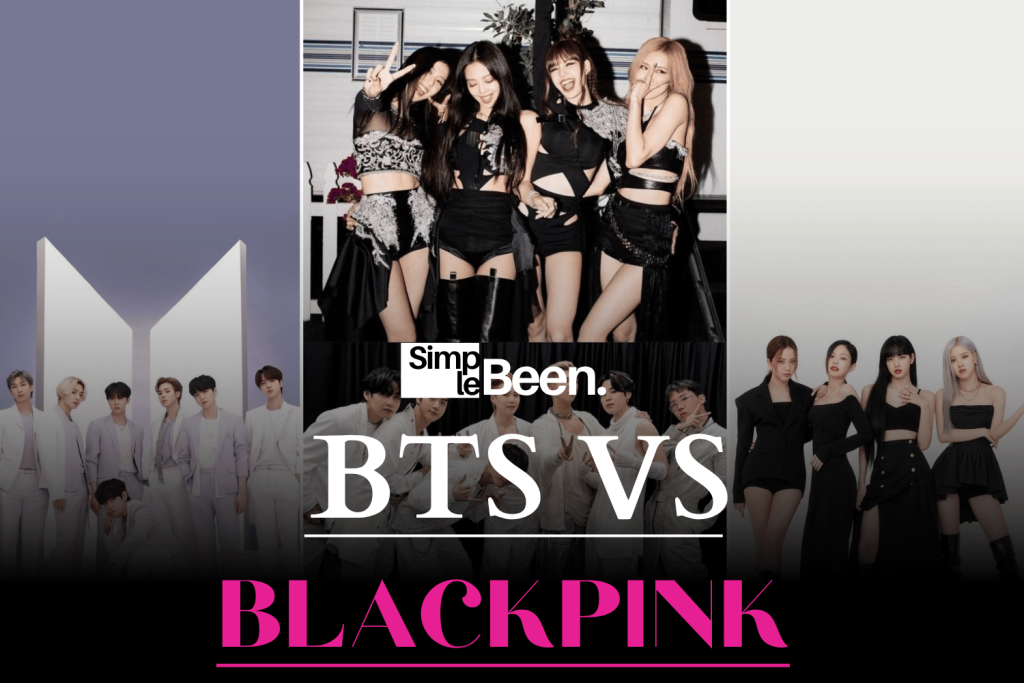
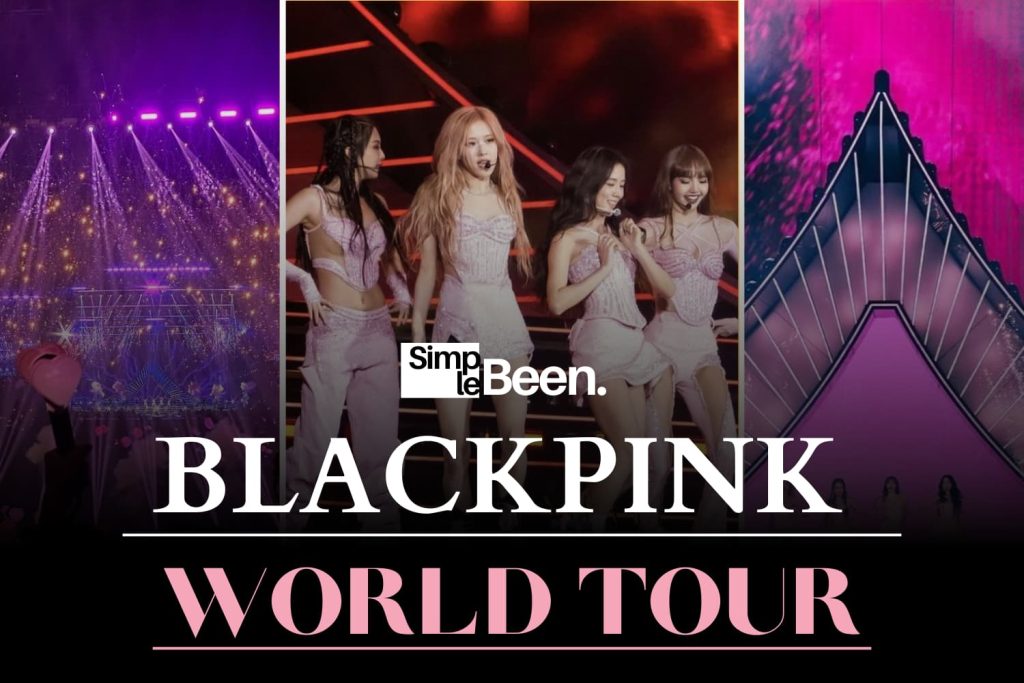
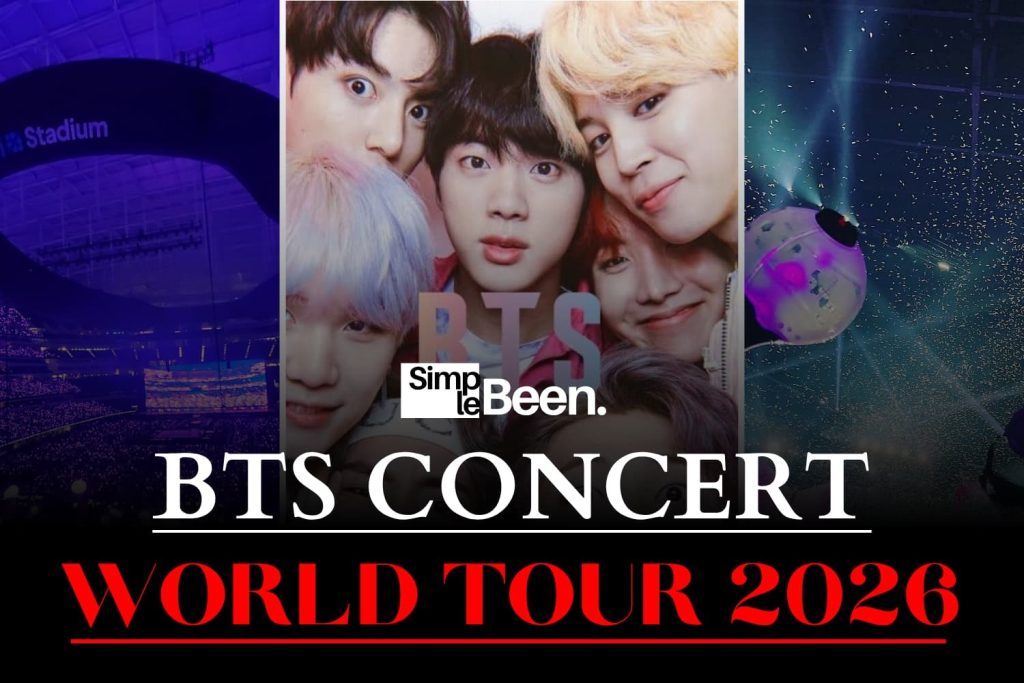
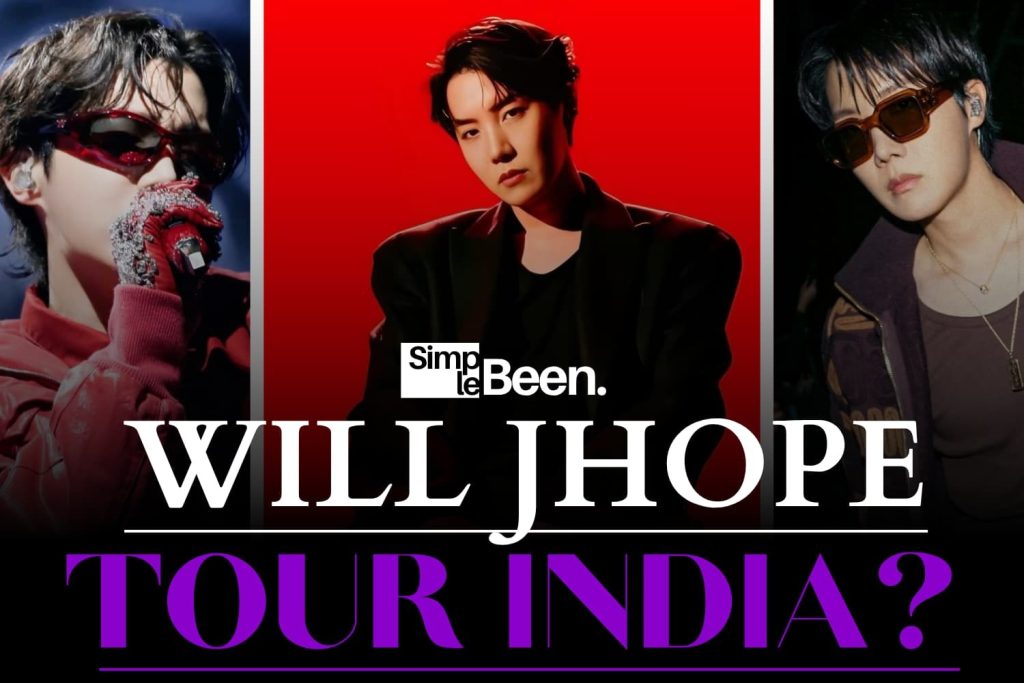
Leave a Comment